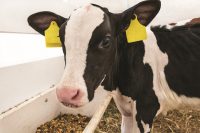COVID-19: Practical guidance for our rural and farming clients #15
Welcome to the 15th edition of our weekly rural update keeping the farming and rural community up to date with financial information and guidance. You can find all previous updates, along with other rural specific articles containing advice and help on navigating your business and family through in the COVID-19 hub on our website.
We are delighted this week to also provide a special ‘Virtual Breakfast’ Q&A for farmers and rural businesses made up of panellists from different areas of agriculture. An agricultural lawyer and land agent will join Richard Haines, our rural accountant to discuss their experiences and provide advice. For more information, head to the bottom of this insight, or register your place here to join us on Friday.

17th June 2020
-
Andrew Vickery See profile
Businesses that must remain closed to members of the public
The government has provided guidance on the businesses that must currently remain closed following the easing of restrictions on 15 June.
- Restaurants and public houses, bars, or other food and drink establishments including within hotels and members’ clubs, such as dining rooms
- Cafes and canteens
- Hairdressers, barbers, beauty, and nail salons
- Holiday accommodation including hotels, hostels, B&Bs, holiday rentals, campsites and boarding houses
- Caravan parks/sites for commercial use.
If your business is still closed and you are facing financial difficulties, please get in touch and we can discuss options available to you.
Self-Employment Interruption Support Scheme (SEISS) – further details on the extension to the scheme
This scheme is being extended, and you’ll be able to claim a second and final grant in August 2020.
HMRC will work out your eligibility the same way as the first grant. If you make a claim for the second grant you will have to confirm your business has been adversely affected on or after 14 July 2020.
This grant will be a taxable grant worth 70% of your average monthly trading profits, paid out in a single instalment covering a further three months’ worth of profits, and capped at £6,570 in total.
You can claim for the second and final grant even if you did not make a claim for the first grant.
The online service for the second and final grant is not available yet. Do not contact HMRC as they will update their guidance when this service is available.
‘Adversely affected’ examples
The government have provided some examples when the ‘adversely affected’ criteria is met for the first and second grant claiming on or after 14 July 2020.
| Scenario |
Adversely affected for first grant |
Adversely affected for second grant |
| A self-employed person was not impacted. They were still able to go to work throughout the whole of the crisis as they were able to work at a social distance.
|
No |
No |
| A self-employed person was unable to find work from March to September because of the government restrictions and economic impact of the crisis on the sites they worked for.
|
Yes |
Yes |
| A self-employed person worked on short-term contracts on various business sites. They’ve only had half the work they would normally have between March to May because some of the sites were closed. They were able to work as normal from June because these sites reopened.
|
Yes |
No |
| A self-employed person worked on short-term contracts on various business sites. They had no work from March to April because these sites were closed. They were able to work as normal from May because they worked on sites which are completely outdoors.
|
Yes |
No |
| A self-employed person was able to work as normal from February to August because they worked completely outdoors. However, they caught coronavirus in August, meaning they had to self-isolate and were unable to work for six weeks while they recovered.
|
No |
Yes |
Flexible Furlough Scheme – Important new changes to the Coronavirus Job Retention Scheme
Over the weekend the government released the details around the changes to the Coronavirus Job Retention Scheme that Rishi Sunak originally announced on 29 May.
Read our insight below for all the detail…
HMRC update - COVID-19 related expenses guidance
HMRC has updated their guidance on how to treat certain expenses and benefits provided to employees during coronavirus (COVID-19) to include information about paying travel and subsistence expenses to an employee travelling to a temporary workplace.
Join Us: ‘Virtual Breakfast’ Q&A for farmers and rural business with guest panellists - Friday 19 June - 9am
Join us this Friday for a special live breakfast where, alongside Richard Haines, Director and Rural Adviser at Old Mill, we are delighted to welcome agricultural lawyer Angus Williams, Partner and Head of the Farms & Estates team at Royds Withy King and Land Agent Chris Powell, Associate in the Farm & Rural team at Woolley & Wallis.

Angus and Chris will be available to answer your questions on agricultural law and land and discuss the marketplace with COVID-19 and their take on the business implications and opportunities for farmers and rural businesses.
You are welcome to submit questions beforehand to marketing@om.uk or during the event.
Click here to register for our ‘Virtual Breakfast’.
This week we will be using Zoom instead of Microsoft Teams. Once you register for the event, a link will be sent to your email for entry. If you have any problems registering or accessing the event, please let us know by contacting marketing@om.uk.
Missed last week’s? Watch it back here... 'Virtual Breakfast' Q&A with Rural Accountant, Neil Cox and Chartered Financial Planner, Julia Banwell.
https://om.uk/insight/watch-it-back-virtual-breakfast-qa-with-rural-accountant-neil-cox-and-chartered-financial-planner-julia-banwell-12-06-20/

For more information, or if you have any questions about any of the above, please contact your Old Mill adviser or email enquiries@om.uk.

